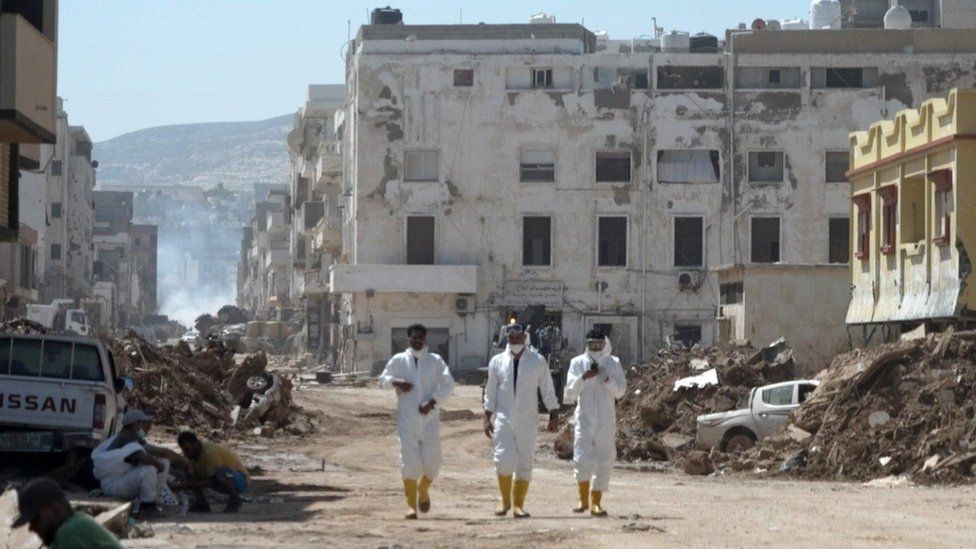-

-
-
Loading

Loading

The journey to the eastern Libyan city of Derna now takes twice as long due to the recent devastating floods. As you drive along the road from Benghazi, the fields transform into rust-red lakes. The traffic begins to slow down as you get closer to Derna. Telegraph poles can be seen haphazardly lying on the ground after being pulled out by the floodwaters. Cars cautiously navigate around holes in the highway, following hastily-dug detours created by diggers. One of the closest bridges to Derna has been completely washed away. Locals gather near the damaged road, looking over and taking pictures. Not far from there, soldiers hand out face masks to every car, including the driver and passengers. It becomes evident that everyone driving in the opposite direction is wearing these masks, and soon you realize why. The smell of death in certain parts of the city is difficult to put into words. It fills your nostrils, blending the scent of sewage with something more indistinguishable. The stench can be overpowering, especially when you stand by the port where recovery teams inform me that bodies are still being discovered. On that morning alone, three bodies have been found carried in by the tide, becoming trapped amongst the piles of debris decaying in the seawater. Broken wood, cars, tires, fridges, and various other items mingle and swirl together in the stagnant water. The images and videos that have emerged from Derna have been graphic and shocking, but they do prepare you for the extent of the damage caused by the floods. The river appears as an open wound, gaping and stretching almost a hundred meters across in some areas. The mounds of mud left in its wake contain nothing at all. It is a desolate wasteland. The destructive force of the water has been truly extraordinary. Cars are strewn about like discarded toys, some lying on their sides and others completely upside-down. One car has even been propelled inside the terrace surrounding the distinct Al Sahaba Mosque. Another is wedged into the side of a building, partially suspended off the ground. Thick concrete walls have crumbled, and sturdy trees have been uprooted, with their roots reaching towards the sky. Everything else is simply gone. This disaster didn't just wash away thousands of people; it took their homes, possessions, and lives. Humanity has been eradicated from this part of Derna. For the survivors, life will never be the same. Grief and anger permeate the air. Faris Ghassar, who lost five family members in the floods, expresses his frustration and questions why they were told to stay in their homes without being warned about the storm or the deteriorating dam. Some of the destroyed buildings were over a hundred years old, and Faris blames politics for the lack of action. With a government in the west and another in the east, he sees it as a significant problem. Faris shows me pictures of his family on his phone, first when they were alive and then their bodies, carefully wrapped in blankets, indicating their ordeal. Meanwhile, a convoy of ministers from the eastern government, one of Libya's opposing authorities, tours the disaster zone. Their ongoing conflict has greatly contributed to the destruction of the country's infrastructure, according to Faris. When I asked eastern Prime Minister Osama Hamad how the dams were supposed to protect people but failed, he attributed it to the strength of the cyclone and considered it the work of nature and God. On the streets, rumors circulate about a possible full evacuation of Derna. Those who remain in the city struggle against the elements, with limited access to clean water and medical care. Almost a week after the deadly storm, the challenges faced by the survivors continue to grow.